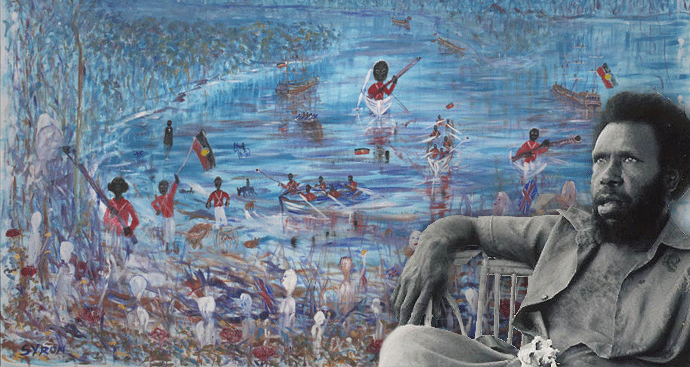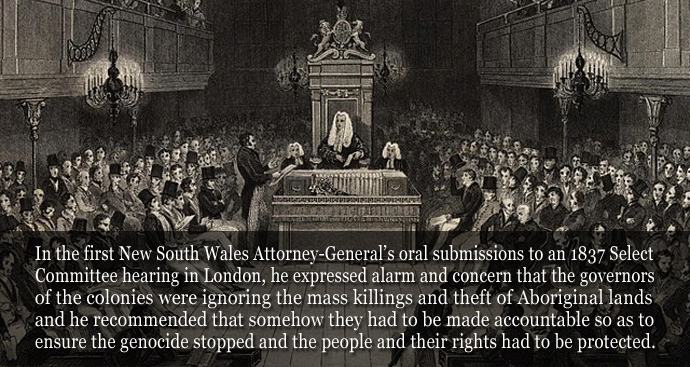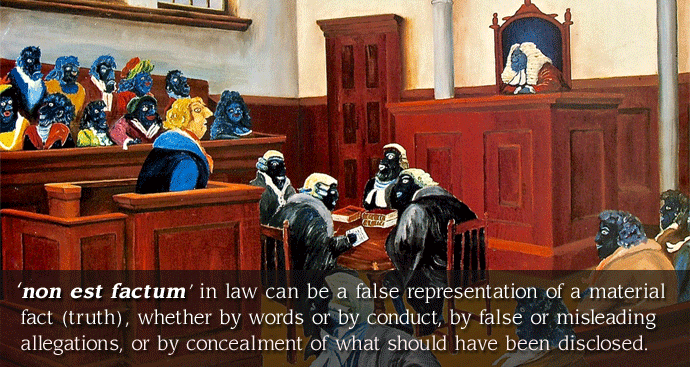Colonial fraud against First Nations and Peoples: understanding 'non est factum'
 Right: Eddie Mabo (cropped), Background: 'The Black Bastards are Coming, No. 3', Oil painting by Aboriginal artist Gordon Syron, 2006 (tinted), National Museum of Australia. Original Gordon Syron painting copy
Right: Eddie Mabo (cropped), Background: 'The Black Bastards are Coming, No. 3', Oil painting by Aboriginal artist Gordon Syron, 2006 (tinted), National Museum of Australia. Original Gordon Syron painting copy
7 February 2020
Ghillar, Michael Anderson, Convenor of the Sovereign Union, last surviving member of the founding four of the Aboriginal Embassy and Head of State of the Euahlayi Peoples Republic asserts further argument that First Nations Law is the Law of the Land and many First Nations Peoples are being misled by the colonial fraud, which is non est factum, i.e. "It wasn't the actual act I thought I was doing," which invalidates the agreement.
The Mabo (No: 2) decision of 1992, changed Australian legal system forever.
Mabo v Queensland (No 2) ("Mabo case") [1992] HCA 23; (1992) 175 CLR 1 (3 June 1992)
This decision restored ownership of all our Laws and Culture to us as Sovereign Peoples. I admit that it did not say Sovereign Peoples, but does so by implication through the recognition of our Laws and customary practices.
Unfortunately, the occupying colonial States gathered together the colonial-educated modern-day 'two bob black trackers' to work with them to establish a deceitful piece of legislation, the Native Title Acts, that further marginalised us and set our mobs against each other. This was increasingly complicated by the establishment of the remote-controlled Native Title Service Corporations to manipulate and control the processes that the occupying State established to act fraudulently and to promote falsely the notion of Native Title ownership, by agreeing to the recognition of Native Title.
This colonial law is wrong. It is a law that cheats all our Peoples out of our ownership of all our lands, water and natural resources and ownership of all of our native flora and fauna, which are our families through our Totemic Law rules. This Native Title law also keeps us outside-in the drought without shade and we are burning up, just like our native bush. The 'two bob black trackers' control all negotiations and dictate what they say our people should get and agree to. Not many of our people are brought in to negotiate their own deals because it is argued, the people do not know what is going on, so they say: "Let us, the Native Title Service organisation, do it because this is what the Government funds us to do for you." But, what these Native Title Service Corporations do not tell you is how much they charge these mining companies and others like electricity companies and Telstra. You don't get any of that money, it's their 'fees'.
Native Title is about taking everything from us. Our mob gets happy when a judge says, "Yeh, this court recognises that your Native Title continues," or the government says, "We consent to this Native Title."
When governments consent, they are entering into a contract only. They are NOT recognising you in a way that establishes proper sovereign ownership. No, they can take it all back at any time. Besides you don't get anything in the first place. And might I say, no just terms compensation for the land that they say is "extinguished Native Title".
The whole process is a lie. The High Court is a British Court, we must remember this.
Under the Mabo No. 2 judgement, the Common Law of Australia recognises our Law and Culture and our sovereign inherent rights to all our lands. Native Title is about making dust so that we cannot see our legal rights in their system. The Native Title lawyers do not represent our interests, they work under Native Title law and that gives us nothing. They say they work to the Black Letter of the law. In other words if it's not written, then it does not exist!
When our people sign agreements which they do not fully understand and have not had the repercussions of signing explained properly to them, then the agreement is invalid. It is what their legal system calls NON EST FACTUM, meaning AN ACT OF FRAUD. Non est factum means, "It wasn't the actual act I thought I was doing," which invalidates the agreement.
So, what is FRAUD? In the English common law, it is defined as 'an intentional misrepresentation of material existing fact made by one person to another with knowledge of its falsity and for the purpose of inducing the other person (YOU) to act, and upon which the other person relies. The result being, YOU suffer a further loss that continues the injuries, damage, grief and loss.'
In other words: A false representation of a material fact (that is, truth), whether by words or by conduct, by false or misleading allegations, or by concealment of what should have been disclosed (the truth).
Another way of defining fraud is: to deceive, and is intended to deceive, another so that an individual will act upon it to his or her legal injury. This way if you agree not knowing what they truly are doing, you are the one who is injured and suffer the loss.
We have every legal right to stand up and take back what is ours. Our Land, Our Law and Culture is not inferior to the occupier's laws. In fact, their Law is NOT superior to ours. Our Law and Customary practises ARE the Law of this Land. To argue otherwise is to create a 'Conflict of Law'.
The High Court in Mabo (No. 2) (1992) states unequivocally, that we cannot challenge the colonial occupiers' sovereignty in their municipal courts because this question belongs to another jurisdiction. No doubt they are referring to the International Court of Justice (ICJ). The reasoning behind this, is that the local municipal courts are created by the occupying State colonies and govern here at the pleasure of the British Crown where their claim of ownership comes through the 'Sovereign', the Queen and her representatives. These colonial courts can ONLY deliberate on the laws of the Occupier State. These same courts do not have any jurisdiction in respect to First Nations Laws, because these Laws have belonged to First Nations from the time of creation.
I must say that it also goes the other way. If we cannot challenge them on the question of 'Sovereign Rights', then they cannot challenge us within their legal system about our 'Inherent Sovereign Rights'. We have every right to exercise our rights under our law and customary practises and they cannot stop us, because any interjection in our business creates a conflict of laws and resolution of these conflicts belong to another jurisdiction outside of this occupier's control. The colonial laws are 'other' to our First Nations.
So then, the question is: how do we go about untying all of this and assert our 'Rights'?
I will address this by showing you, the mob, and our supporters what has been hidden from us all these years.
The lawyers, who say they represent our interest, fail us because they choose NOT to do their due diligence on the law and laws created by the English Crown and the British Parliament that recognises our 'Justiciable Rights'.
So what does it mean for a case to be justiciable?
Justiciability refers to limits upon legal issues over which a court can exercise its judicial authority ... For example, in order for a court to hear a case, the plaintiff must have standing to bring the claim, the legal question must not be moot or unripe, etc
Further, what are some rules of justiciability?
The four justiciability doctrines are standing, ripeness, political question, and mootness. These doctrines will render a controversy "nonjusticiable" if a court decides that any one of them applies. Standing addresses whether the plaintiff is the proper party to assert a claim in federal court. Feb 7, 2007
Let me define the four points identified above as the requirements to have a case:
-
Standing: The legal definition is defined as:
Standing Law and Legal Definition. Standing is the ability of a party to bring a lawsuit in court based upon their stake in the outcome. A party seeking to demonstrate standing must be able to show the court sufficient connection to and harm from the law or action challenged.
Ripeness: is an American concept which is defined as:
In United States law, Ripe Law and Legal Definition. Ripe, in the legal context, means that a case is ready to be litigated before the Supreme Court for consideration because all other avenues for determining the case have been exhausted, there is a real controversy and the law needs to be settled on one or more issues raised by the case.
Mootness; is defined as:
Mootness Doctrine Law and Legal Definition. Mootness doctrine is a principle of judicial procedure whereby American courts will not decide moot cases that is, cases in which there is no longer any actual controversy. The inability of the federal judiciary to review moot cases derives from the requirement of U.S. law.
And finally, what is a justiciable constitutional question?
In United States constitutional law, the political question doctrine is closely linked to the concept of justiciability, as it comes down to a question of whether or not the court system is an appropriate forum in which to hear the case ... then the court will refuse to hear that case.
We are Sovereign First Nations, who have never been beaten in a war that was declared against us by the British, nor have we ever ceded our sovereignty to anyone. This is confirmed in the occupier's own courts where Justice Willis (1841) cited one aspect of the Report from the Select Committee on Aborigines (British Settlements) for his ratio decidendi. This is a Latin term meaning 'the rationale for the decision'. It is a legal phrase, which refers to the legal, moral, political and social principles used by a court to compose the rationale of a particular judgment. The Select Committee stated:
If this colony were acquired by occupying lands as were uncultivated and unoccupied by the natives and within the limits of the sovereignty asserted under the commission, the aborigines would have remained unconquered and free, but dependent tribes, dependent on the colonists as their superiors for protection, their rights as distinct people cannot, from the peculiar situation, be considered to have been tacitly surrendered. But frequent conflicts that have occurred between the colonialists and the Aborigines within the limits of the colony of New South Wales make it, I think sufficiently manifest that the Aboriginal tribes [are] neither a conquered people, nor have tacitly acquiesced in the supremacy of the settlers.
To add to my arguments for us to assert our rights ASAP, is the Morrison Government moving to have his Aboriginal friend and political ally, Ken Wyatt, 'pacify the Natives', saying, "We are here to help you unfortunates. Look at me! This is what you can achieve if you roll over and let me rub your belly".
I wish to end this statement by showing you all what has been hidden from us all these years.
In 1836/37, the British Parliament established the Select Committee 'appointed to consider what measures ought to be adopted to the NATIVE INHABITANTS of Countries where BRITISH SETTLEMENTS are made, and to neighbouring Tribes, in order to secure to them the due observance of Justice and protection of their Rights; to promote the spread of Civilisation among them, and to lead them in the peaceful and voluntary reception of the Christian Religion.'
 Cropped background image of the British House of Commons Chamber, 1834 Source Wikipedia
Cropped background image of the British House of Commons Chamber, 1834 Source WikipediaWhen the committee's Report to the British House of Commons in 1837 was presented they commenced their report by stating:
The duty of introducing into our relations with uncivilised nations the righteous and the profitable laws of justice is incontrovertible, and it has been repeatedly acknowledged in the abstract, but has, we fear, been rarely brought into practice; for, as, a nation, we have not hesitated to invade many of the rights which they hold dear.
Thus, while Acts of Parliament have laid down the general principles of equity, other and conflicting Acts have been framed, disposing of lands without any references to the possessors and actual occupants, and without making any reserve of the proceeds of the property of the natives for their benefits." [p.4 Vol 1, part II, 1837]
And the Report goes on:
And that if any shall dare to offer any violence to them in their persons, goods or possessions, the said governors do severely punish the said injuries, agreeable to justice and right " [p.4 Vol 1, part II, 1837]
It was this command that Saxe Bannister Esq. the first New South Wales Attorney-General, was referring to in his oral submissions to the Select Committee's hearings in London. He expressed alarm and concern that the governors of the colonies were ignoring the mass killings and theft of our lands and he recommended that somehow they had to be made accountable so as to ensure the genocide stopped and the people and their rights had to be protected.
In respect to all submissions made to this enquiry the report stated:
... Too often, their territory has been usurped; their property seized; their numbers diminished; their character debased; the spread of civilisation impeded. European vices and diseases have been introduced among them, and they have been familiarised with the use of our most potent instruments for the subtle or the violent destruction of human life, viz, brandy and gun powder [p.5 Vol 1, part II, 1837]
A most convincing admission was made in this Select Committee when it concluded that:
It might be presumed that the native inhabitants of any land have an incontrovertible right to their own soil: a plain and sacred right, however, which seems not to have been understood. Europeans have entered their borders uninvited, and, when there, have not only Acted as if they were undoubted lords of the soil, but have punished the natives as aggressors if they have evinced a disposition to live in their own country " [p.5 Vol 1, part II]
None of this was ever relayed to our people. We just did not know what our rights were at that time. Now they continue to tell us lies and make promises to blindfold our mob from knowing that formal legal arrangements were made to protect our rights, but now they send our own kind in the form of a Minister and his personally chosen 'voice to parliament' to tell us more lies, misrepresent the true nature of our culturally appropriate decision-making under our Law and Customs. This 'voice' gave away our Land Rights for a fraudulent process to take what is left of our rights. This 'two bob mob' of 'colonially educated' members, posing as the 'voice to parliament', is yet again another insult to our Nations and Peoples.
This all has to stop. No more. Time to take back what we own. We must show leadership at the grassroots, so that our young ones can see not only a future, but also have one. This might stop them from suiciding. The imposed society is so rotten that even its youth and defence force members are turning to suicide - signs of a collapsing regime.
We are the Elders. We must show leadership and take action.
 Contact: Ghillar Michael Anderson
Contact: Ghillar Michael AndersonConvenor of the Sovereign Union,
Head of State of the Euahlayi Peoples Republic
Contact Details here


